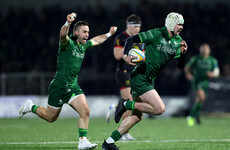MUNSTER HAVEN’T SAID if it’s a coincidence or not that their management group now consists entirely of Munster men, but the message is clear – the last two years were not acceptable, so we’re taking a completely different route.
There’s no doubt that in terms of consistency the Penney/Mannix era was a step backwards. But now that it’s over the only relevant question is did the province learn anything about itself in the last two years, or was this just a holiday fling, an isolated experiment with no follow-on?
When a coach goes to extremes with his methods, and then isn’t deemed to have succeeded, there tends to be a yearning to do the exact opposite of what went before. Just because Rob Penney didn’t win any titles, though, doesn’t mean having second rows attempt tricky offloads is a bad thing.
Anthony Foley is, above all, a measured man, best remembered as a player for his calm demeanour and decisive decision making. If we’re to go by the opinion of almost every single ex-Munster player currently working in the media then we can safely say he has already done a good job. For all he has achieved with Ireland and Munster, however, the plan he opts for next season will define him as a coach.
As happy as some fans may now be to see the back of Penney, its easy to forget the last game before he took over (under Tony McGahan) was the most toothless display in the province’s professional history, a 45-10 filleting at the hands of the Ospreys in a Pro12 semi-final.
Change was needed, and Penney, in theory, offered something completely different, something potentially very modern. In choosing the New Zealander, the inference was that greater sophistication was required. The set piece game was no longer enough to win a European Cup, the southern hemisphere influence was growing, and Munster wanted a little slice of Canterbury.
It was a brave move to put everything they had built into the hands of men with no previous connection to the province, and one that showed a degree of self awareness. In the same way Leinster finally recognised they needed somebody like Michael Chieka to give their pack a hard edge, Munster too realised they required more of a cutting edge.
Communication
The last ten minutes of the Glasgow game, then, must have been the most depressing of the Penney reign, because in that brief period the players showed they were no more comfortable with the system than the day they first tried it. Whether it was the coach’s fault or the players’ didn’t really matter, it was clear this thing was never going to work no matter how much time they spent at it.
What about his verbal messages, though, the ones he communicated through the media; Munster no longer had a pack that could bully other sides; the game had fundamentally changed since 2008; players weren’t always engaged; real change takes time and investment.
In the end he wasn’t given the time he thought he needed. He also wasn’t being offered the next David Wallace or Denis Leamy by his academy. And unlike his counterparts in Ulster, Connacht and Leinster, he wasn’t backed with any big signings. The reality too though is Penney didn’t give Munster enough credit for the skills they’d shown throughout their history. They were ultimately more accurate, more skillful and more entertaining under Kidney, McGahan and Gaffney.
It will be interesting to observe over the next couple of years whether CEO Garret Fitzgerald and the main decision makers in Munster believe an influx of local coaching talent alone will be enough to solve all the problems on the field of play.
Its impossible to predict how successful a management team will be, but Leicester, Ulster and Toulouse have shown over the years that the boot room system can work in rugby.
There are some really impressive characters among those brought in, and importantly most have worked elsewhere at various stages (Jerry Flannery at Arsenal, Mick O’Driscoll at Perpignan, Niall O’Donovan and Anthony Foley with Ireland).
No other heavyweight club in Europe, though, has ever attempted as drastic a change in style as Munster have under Penney but the hope is that this group of ex players will try to recreate the mid 2000’s culture all over again. They all know first hand how much work that will involve.
Simon Hick is the man behind the rugby on Second Captains, you can follow them on Twitter here.













Loved watching her in the 90s. Starting so young was probably her undoing. Was fabulous to see her comeback in doubles in her twilight sporting years.
Legend. Oozed class. Female Fed !
One of the greats. Sad to see her go.
She was a “lady” tennis player compeating with “men”